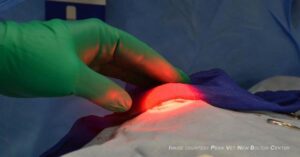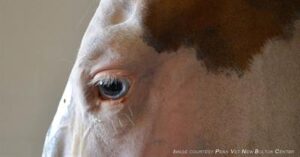Images courtesy Louisa Shepard, Penn Vet New Bolton Center
Veterinarians at the University of Pennsylvania’s School of Veterinary Medicine recently collaborated with their School of Medicine counterparts to pioneer an innovative treatment for cancerous tumors around a horse’s delicate eye area.

Squamous cell carcinoma is a form of skin cancer caused by UV light exposure, and it seems to develop more frequently in horses lacking pigment around delicate eye tissue. When a tovero mare named “Anita” arrived at the Penn Vet New Bolton Center treatment facility with large cancerous masses around her eyes, the Penn Vet team decided to try to save the mare’s eyes by using photodynamic therapy—a cancer-killing laser treatment developed by the University of Missouri College of Veterinary Medicine. Photodynamic therapy is more commonly used in human cancer treatment, so Penn Vet enlisted the help of their Penn Med colleagues to perform the procedure.
 The surgery was a success, and Anita is recuperating—read full details about the case on the Penn Vet website.
The surgery was a success, and Anita is recuperating—read full details about the case on the Penn Vet website.
Paint Horse owners often inquire about treatment and prevention of squamous cell carcinoma in their bald-faced, blue-eyed horses. Conventional treatment, based on individual case assessment of course, includes tumor removal and skin grafts. Prevention can include use of UV-repelling fly masks, sunscreen, limited turnout and tattooing protective dark pigment around the horse’s eyes. APHA detailed the eye tattoo procedure in the article “Ink of an Eye.”
Tattooing protective pigment around a horse’s eyes is an approved procedure by APHA, but the horse owner must notify the association and have the change recorded on the horse’s registration papers. Doing so is easy—simply submit your horse’s original registration papers to our APHA MemberCare team with a statement and current photographs, and APHA will make the change to your horse’s certificate free of charge. The association does not maintain a list of professionals who offer equine protective eye tattooing services, so if you’re interested in learning more about this procedure, check with your veterinarian or nearby veterinary colleges.
##
[Reprinting all or part of this news release is permitted, so long as credit is given to the Paint Horse Journal and a link provided back to apha.com.]
About APHA
The American Paint Horse Association is the world’s second-largest international equine breed association, registering more than a million horses in 59 nations and territories since it was founded. APHA creates and maintains programs that increase the value of American Paint Horses and enriches members’ experiences with their horses.





